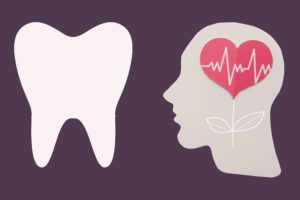
If you are suffering from mental health challenges, your teeth may be taking a toll.
Studies have shown a link between gum disease and conditions such as stress, anxiety, and depression.
Data from the National Health and Nutrition Examination Survey showed almost two-thirds of people with depression reported having a toothache in the last year. The same survey showed that half of all people with depression would say their teeth are in fair or poor condition.
Why is this?
Anxiety and depression can cause side effects that may damage your teeth and gums. These challenges may cause you to self-medicate with smoking or eating. You may be suffering from oral side effects such as teeth grinding and jaw clenching (bruxism). You may also be more susceptible to canker sores.
Both anxiety and depression cause your body to produce a hormone called cortisol. When cortisol levels increase in the body, your immune system becomes weaker. A weaker immune system leaves your mouth more vulnerable to conditions like gum inflammation (gingivitis) and gum disease (periodontitis).
Medication prescribed to provide relief from anxiety or depression can also create a side effect that can contribute to oral health conditions. It is not uncommon for these medications to cause dry mouth. Lack of saliva means that your mouth isn’t cleaning itself as readily, by washing away food debris, bacteria, and plaque. This makes your teeth a prime target for cavities.
Making matters worse.
If you are feeling anxious or depressed, you may be avoiding regular dental checks or fail to maintain proper oral hygiene. Both, important factors in maintaining a bright and healthy smile.
If you neglect maintaining your oral health this could make matters worse for your mental health. You could end up in pain, or maybe you’ll feel embarrassed about the appearance of your teeth. This could lead you to avoid people or smiling altogether. Smiling is good for us plays a huge role in our well-being.
Dr. Pumphrey can help.
If the oral health effects of anxiety and/or depression are contributing to your lack of well-being, there is good news. There are ways to fight back! The first step is to make sure you are brushing and flossing your teeth twice daily. These very basic habits really go a long way in maintenance of your oral health.
However, you made need more intensive work. If this is the case, Dr. Pumphrey would love to discuss with you how he can help you feel better by helping you look better. We offer a free, simple, low stress virtual consult or you may also give our office a call. We look forward to being a part of helping you maintain a state of well-being.







